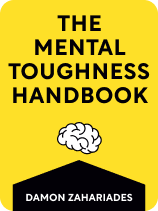

This article is an excerpt from the Shortform book guide to "The Mental Toughness Handbook" by Damon Zahariades. Shortform has the world's best summaries and analyses of books you should be reading.
Like this article? Sign up for a free trial here.
What is mental toughness? Why is it important? How does mental strength benefit you?
Mental toughness is a state of mind that you learn and earn through hard work, persistence, and patience. In The Mental Toughness Handbook, Damon Zahariades provides a guide to building mental fortitude so you can confront challenges and navigate adversity.
Read on to learn more about mental toughness and its benefits, according to Zahariades.
What Is Mental Toughness?
According to productivity expert Damon Zahariades, you build mental toughness by controlling negative emotions, cultivating your self-confidence, and reframing failures and setbacks as opportunities. However, before you can learn to cultivate it, it’s important to understand exactly what mental toughness is and how it can benefit you. In his book The Mental Toughness Handbook, Zahariades offers his definition of mental toughness, including why it’s important and how it can benefit your life.
Zahariades’s Definition of Mental Toughness
What is mental toughness? Zahariades defines it as strength and fortitude in the face of stress and obstacles. Mental toughness centers on your ability to effectively manage negative emotions like anger, fear, and sadness so they don’t control and lead you to make bad decisions. It also reflects your persistence and resilience in moments of hardship. Mental toughness isn’t something you’re born with, but a state of mind you can cultivate with patience, passion, and hard work.
(Shortform note: Experts say that the concept of mental toughness is rooted in the work of sports psychologist Dr. Jim Loehr, who worked with champion athletes. He defined mental toughness as the ability to consistently perform at the height of your talent and skill level regardless of who your competition is. Other experts honed Loehr’s definition to reflect a psychological edge that keeps you more focused, confident, and in control than your competitors are in the face of stress. They’ve also added that mental toughness comprises values, behaviors, and emotions that help you progress toward your goals in good times and in hard times.)
What Are the Benefits?
You can see the perks of mental toughness in the behavior of people who are mentally strong. Like them, when you become mentally tough, you’ll be able to:
1) Act rationally and confidently under duress. Mentally tough people are attuned to and resist negative emotions like anger, fear, sadness, and anxiety, as well as negative self-talk. When you refuse to allow negative feelings and critical thoughts about yourself to consume you and cloud your judgment, Zahariades says you’ll avoid making poor decisions or quitting altogether. Instead, you’ll be able to think with a clear head and stay the course.
(Shortform note: Experts say that when you classify emotions as “bad” or “undesirable,” as Zahariades does, you actually increase your risk of derailing yourself because you’re more likely to try to suppress feelings you believe are undesirable. This is different from resisting negative emotions, as Zahariedes recommends, because instead of focusing on not allowing the feelings to control you, suppressing emotions attempts to bury them. This can lead to difficult emotions, like anger, building up inside you to the point that, eventually, you explode.)
2) Maintain a clear focus. Mental toughness benefits people because they often know the underlying reasons why they’re pursuing their goals, and they don’t allow their need for immediate gratification or their emotional pain to derail them. When you cave to your impulses or let past mistakes and grievances haunt you, you don’t have time or energy to stay focused on what you’re trying to achieve. Understanding the purpose of your actions serves as a grounding force that you can remind yourself of when you encounter roadblocks, making you more likely to persist and achieve your goals.
(Shortform note: In As A Man Thinketh, James Allen builds on the idea that purpose serves as a guidepost, explaining that purpose gives you a positive, productive place to center your thoughts so your mind doesn’t drift and get lost in feelings of fear, doubt, and self-pity. By consistently focusing intensely on your purpose and resisting pessimistic thoughts, you can train your mind to attune itself only to thoughts that lead to positive behaviors, which will create healthy thinking patterns and increase your ability to control your life.)
3) Have a positive yet realistic mindset. The mental toughness mindset enables people to function at their highest level. It’s rooted in the fact that they accept that: a) the world is unpredictable, b) obstacles, setbacks, and change are a natural part of life, and c) the way to make progress is by confronting these realities head on. When you have this mindset, Zahariades says, you can remain realistic yet positive in the face of uncertainty, look for opportunities and hope where others don’t see it and make the most of bad situations.
(Shortform note: Experts say it’s tricky to balance a realistic and optimistic mindset when you’re going through a tough time, but striking that balance can help you and inspire others to persist. They offer advice for attending to these two disparate concepts simultaneously: First, set aside five minutes each day to both acknowledge positive things in your life and consider challenges you need to address. Second, look forward to the future while also acknowledging that changes you hope to make will take time. Finally, reflect on your tendency to be overly positive or overly negative, and adjust, where needed, to bring these factors into alignment with reality.)
Critically, people who build mental toughness also distinguish between what they can and can’t change—and channel energy only into what they can. Zahariades explains that when you focus exclusively on the things you can influence, you won’t lose time on, or get discouraged by, trying and failing to change things beyond your control.
(Shortform note: If you have a hard time stopping yourself from focusing on things you can’t change, you may be prone to rumination, a mentally harmful process where negative thoughts repeat in a loop in your brain continuously. For example, if you’re concerned about mass shootings, you may fixate for hours on the thought that you’re at risk of being shot every time you go to the grocery store. Research suggests you can reduce rumination with quick hits of activity like vacuuming or going for a jog. You can also choose to not feed your ruminating thoughts by naming and talking back to them: “I see you, ‘Grocery Store Shooting Fear.’ I’m not engaging with you now.”)
4) Be resilient in the face of setbacks and failure. Mentally tough people recognize that disappointment, mistakes, and failure are natural parts of life, seeing them as opportunities to learn and grow. When you stop seeing failure as a reflection of your adequacy or worth, Zahariades says you’ll be more open to taking risks and trying new things—and you’ll feel less defeated each time you hit roadblocks, which will help you to bounce back more quickly.
(Shortform note: Experts suggest several other ways to bounce back from failure and setbacks. First, apply the 10/10/10 test: Ask yourself whether the failure will matter 10 weeks, 10 months, or 10 years from now. This will give you a sense of perspective so the offending event doesn’t consume you. Second, resist the urge to hole up and isolate yourself after the failure or setback. Instead, reach out to a friend who you know will make you feel better by distracting you or making you laugh.)

———End of Preview———
Like what you just read? Read the rest of the world's best book summary and analysis of Damon Zahariades's "The Mental Toughness Handbook" at Shortform.
Here's what you'll find in our full The Mental Toughness Handbook summary:
- A step-by-step guide to building mental fortitude and resilience
- How to reframe failures and setbacks as opportunities
- How to develop long-lasting habits to increase your mental toughness






